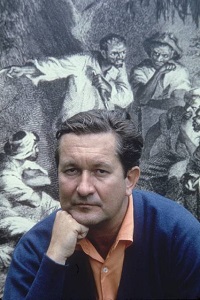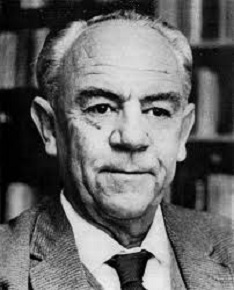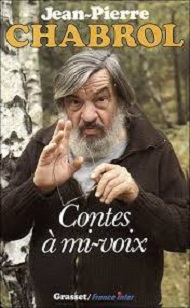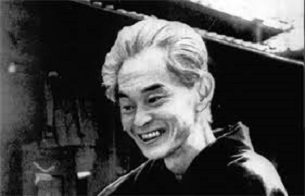De Amerikaanse schrijver William Styron werd op 11 juni 1925 in Newport News in de staat Virginia geboren. Zie ook alle tags voor William Styron op dit blog.
Uit: The Confessions of Nat Turner
“I suppose the truth is simply that it was possible for benefits like these to accrue only to a Negro lucky enough to remain in the poor but relatively benign atmosphere of Virginia. For here in this worn-out country with its decrepit little farms there was still an ebb and flow of human sympathy—no matter how strained and imperfect—between slave and master, even an understanding (if sometimes prickly) intimacy; and in this climate a black man had not yet become the cipher he would become in the steaming fastnesses of the far South but could get off in the woods by himself or with a friend, scratch his balls and relax and roast a stolen chicken over an open fire and brood upon women and the joys of the belly or the possibility of getting hold of a jug of brandy, or pleasure himself with thoughts of any of the countless tolerable features of human existence.”
(…)
“I reckon even you didn’t know the actual statistics, hiding out until now like you done. But in the three days and nights that your campaign lasted you managed to hasten fifty-five white people into early graves, not counting a score or so more fearfully wounded or disabled—hors de combat, as the Frenchies say, for the rest of their natural lives. And only God knows how many poor souls will be scarred in their minds by grief and by terrible memories until the day they part this life. No,” he went on, breaking off a black wad from a plug of chewing tobacco, “no, I’ll have to hand it to you, in many respects you was pretty thorough. By sword and ax and gun you run a swath through this county that will be long remembered. You did, as you say, come damn near to taking your army into this town. And in addition, as I think I told you before, you scared the entire South into a condition that may be described as well-nigh shitless. No niggers ever done anything like this.”

William Styron (11 juni 1925 – 1 november 2006)
In 1967
De Nederlandse schrijfster Sophie van der Stap werd geboren in Amsterdam op 11 juni 1983. Zie ook alle tags voor Sophie van der Stap op dit blog.
Uit: The Girl With Nine Wigs (Vertaald door Charlotte Caroline Jongejan)
“Before, my daily routine was to wake up at eight for a long run in the park, then have my coffee while rushing off to class. Now I wake up with a cough, and I’m lucky if I can run half the distance in double the time. Lately I need three coffees just to get going, and I’m still late to class every day.
Visiting the hospital is a thrilling part of my new routine. After numerous appointments with multiple doctors in various hospitals and two visits to the emergency room, I now find myself in yet another antiseptic hospital lounge with stale magazines, waiting to see a new doctor with a new diagnosis and a new file.
At this point, I know this hospital like the back of my hand. I’ve spent the past two months wandering from one department to the next, from the top floor to the bottom, from the front to the back. Over and over and over again. I’ve seen eight interns, two gynecologists-why do doctors always assume you’re pregnant when they can’t figure out what’s wrong?-a pulmonary specialist, and two ER teams, and have been prescribed three courses of antibiotics. All to no avail. Between all these doctors, no diagnosis but plenty of symptoms and a lost tampon. Ick. It gave the doctors and my father, who was waiting in the hallway, a big laugh but left me mortified.
My symptoms-a strange jabbing here and there, shortness of breath, the loss of a few kilos (which I’m definitely not complaining about), and a pale face that no amount of blush can mask-don’t seem to bring me to a diagnosis. So here I am in the waiting room. Again. A door opens and I see him-the one hundredth white coat to examine me and try to figure out what is causing all these seemingly unrelated symptoms. He approaches the reception desk, picks up my file, and calls out “Miss van der Stap” while randomly scanning the waiting room to see which of the rumpled contestants has just won a spot in his examination room.”

Sophie van der Stap (Amsterdam, 11 juni 1983)
De Zuid-Afrikaans schrijver en dichter Nicolaas Petrus van Wyk Louw werd geboren in Sutherland op 11 juni 1906. Zie ook alle tags voor N. P. van Wyk Louw op dit blog
Vroegherfs
Die jaar word ryp in goue akkerblare,
in wingerd wat verbruin, en witter lug
wat daglank van die nuwe wind en klare
son deurspoel word; elke blom word vrug,
tot selfs die traagstes; en die eerste blare val
so stilweg in die rook-vaal bos en laan,
dat die takke van die lang populiere al
teen elke ligte môre witter staan.
O Heer, laat hierdie dae heilig word:
laat alles val wat pronk en sieraad was
of enkel jeug, en vér was van die pyn;
laat ryp word, Heer, laat U wind waai, laat stort
my waan, tot al die hoogheid eindelik vas
en nakend uit my teerder jeug verskyn.
Early Autumn
The year matures in golden oak-leaves, in the dun
of darkening vineyards, and, paler at all hours
air washed by fresh winds and the pellucid sun.
Fruits fulfil the individual flowers.
even the slowest, and the first leaves fall
so silently in smoke-dimmed wood and lane
that the slender branches of the poplars tall
lift wither silhouettes each radiant dawn.
Dear Lord, may all these days be sanctified:
let all things fall that were showy and vain
or merely young and far removed from tears;
make riper, Lord, let your wind blow; my pride
strip off, till all that’s great at last shows plain
naked and firm above my greener years.
Vertaald door Guy Butler

N. P. van Wyk Louw (11 juni 1906 – 18 juni 1970)
De Britse dichteres en schrijfster Renée Vivien (eig. Pauline Mary Tarn) werd geboren op 11 juni 1877 in Londen. Zie ook alle tags voor Renée Vivien op dit blog.
Night
The light, in throes of agony, dies at your knee,
Come, o you whose guarded face, so lovely to see,
Carries dejection from years heavy and jaded:
Come, with your deadly welts turning pale, in distress,
With no other scent in the long folds of your dress
Than the breath of flowers which have long since faded.
Come, with your unrouged lips that ignite my desires,
Without rings, – neither rubies, opals, nor sapphires
Dishonoring your fingers, milky as the moon, –
And from your eyes put mirrored reflections to flight…
For it is here: the simple, chaste hour of the night
When hues can oppress, and luxury importune.
Yield up all your chagrin to eternal delight,
Exhale in a profound cry your suffering blight,
All those events of the past, so cruel and senseless,
Leave them to death, to the distance and to silence…
In the dream which to strife gives such sweet condolence;
To the ancient fever of speech: forgetfulness.
I will kiss your hands and your divine naked feet;
Our hearts will cry out for the neglect that they meet,
Will decry the vile words and base gestures anew…
These flights will linger in peaceful security….
You will join your hands in their mystic purity,
And, in the soul-filled shadows, I will adore you.

Renée Vivien (11 juni 1877 – 10 november 1909)
Necar Zadegan (Kerime) en Traci Dinwiddie (Renée) in de film “The Touch” uit 2007
De Franse schrijver Jean-Pierre Chabrol werd geboren op 11 juni 1925 in Chamborigaud. Zie ook alle tags voor Jean-Pierre Chabrol op dit blog.
Uit: Contes à mi-voix
“Chaque matin, je lui apporte son petit déjeuner au lit, puis je le laisse. Un moment après, j’entends sa guitare. C’est un joli moment pour notre maisonnée …
L’été, sa fenêtre reste ouverte. Les passants ralentissent et s’arrêtent de parler dès qu’ils perçoivent les premières notes, puis ils étouffent leurs pas, puis ils retiennent leur respiration. Sous la fenêtre, les plus hardis s’arrêtent un peu, puis ils repartent comme des voleurs avec ce petit morceau de guitare qui ne leur a rien coûté. Ils ne reprennent un pas normal, ils ne recommencent la conversation que longtemps après avoir dépassé la maison. »
(…)
« Ces casse-pieds pouvaient tout se permettre. Le cousin Palamède par exemple. Un vieux célibataire exigeant. La famille ne pouvait l’abandonner à lui-même, alors, elle se l’était réparti : trois mois chez l’un, trois mois chez l’autre. Il fallait voir le Palamède s’asseoir à table, jamais content. Quand la soupe était trop épaisse, il grognait : “Béton ! Béton !” Quand elle était trop claire, il grinçait : “La Garonne …” Après le café, Palamède regardait le cousin quitter la cuisine pour aller donner aux bêtes, la cousine faire la vaisselle, il réclamait sa pipe et son tabac, s’étalait, soupirait béatement : “On est bien, quand on est célibataire, je ne comprends pas que vous vous mariiez, vous autres …”

Jean-Pierre Chabrol (11 juni 1925 – 1 december 2001)
De Engelse dichter en schrijver Ben Jonson werd geboren rond 11 juni 1572 in Westminster, Londen. Zie ook alle tags voor Ben Jonson op dit blog.
The Noble Nature
It is not growing like a tree
in bulk, doth make Man better be;
or standing long an oak three hundred year,
to fall a log at last, dry, bald, and sere;
A lily of a day
is fairer in May,
although it fall and die that night-
It was the plant and flower of Light.
In small proportions we just beauties see:
and in short measures life may perfect be.
Porth Ceiriad Bay
Descended to the shore, odd how we left
the young girl with us to herself, and went
straight to examine the stratified cliffs,
forgot her entirely in our interest.
You marvelled at the shapes the clockwork sea
had worn the stone, talking keenly, until
the pace of this random sculpture recalled
your age to you, and then its anodynes.
And so you turned, pretending youth, courting
the girl as if you were a boy again,
leaving the wry cliffs to their erosion
and me to my observant solitude.

Ben Jonson (ca. 11 juni 1572 – 6 augustus 1637)
Sebastian Armesto als Ben Jonson in de film “Anonymous”, 2011
De Japanse schrijver Yasunari Kawabata werd geboren op 11 juni 1899 in Osaka. Zie ook alle tags voor Yasunari Kawabata op dit blog.
Uit: Snow Country (Vertaald door Edward Seidensticker)
“Her talk of novels seemed to have little to do with “literature” in the everyday sense of the word.
The only friendly ties she had with the people of this village had come from exchanging women’s magazines, and afterwards she had gone on with her reading by herself. She was quite indiscriminate and had little understanding of literature, and she borrowed even the novels and magazines she found lying in the guests’ rooms at the inn. Not a few of the new novelists whose names came to her meant nothing to Shimamura. Her manner was as though she were talking of a distant foreign literature.
There was something lonely, something sad in it, something that rather suggested a beggar who has lost all desire. It occurred to Shimamura that his own distant fantasy on the occidental ballet, built
up from words and photographs in foreign books, was not in its way dissimilar.
She talked on happily too of movies and plays she had never seen. She had no doubt been starved all these months for someone who would listen to her.
Had she forgotten that a hundred and ninetynine days earlier exactly this sort of conversation had set off the impulse to throw herself at Shimamura? Again she lost herself in the talk, and again her words seemed to be warming her whole body.
But her longing for the city had become an undemanding dream, wrapped in simple resignation, and the note of wasted effort was much stronger in it than any suggestion of the exile’s lofty dissatisfaction. She did not seem to find herself especially sad, but in Shimamura’s eyes there was something strangely touching about her. Were he to give himself quite up to that consciousness of wasred effort, Shimamura felt, he would be drawn into a remote emotionalism that would make his own life a waste.
But before him was the quick, live face of the woman, ruddy from the mountain air.”

Yasunari Kawabata (11 juni 1899 — 16 april 1972)
Zie voor nog meer schrijvers van de 11e juni ook mijn vorige blog van vandaag.
